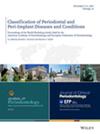Artificial intelligence with counseling on the treatment outcomes and quality of life in periodontitis patients
Abstract
Background
To evaluate the effects of artificial intelligence (AI)-assisted dental monitoring (DM) with and without health counseling on the treatment outcomes and oral health-related quality of life (OHRQoL) of patients with periodontitis.
Methods
Patients with periodontitis were randomly assigned to either an AI group (AI group, n = 28), an AI and health counseling group (AIHC group, n = 27), or a control group (n = 27). All patients underwent nonsurgical periodontal treatment. Patients in the AI and AIHC groups underwent additional AI-assisted DM and AI-assisted DM with oral health counseling, respectively, for 6 months. Data on OHRQoL and periodontal measures were collected at baseline and follow-ups.
Results
At 3 months of follow-up, the AI and AIHC groups exhibited a significantly greater reduction in probing pocket depth (mean diff: −0.5 and −0.7) and clinical attachment level (mean diff: −0.5 and −0.6) compared with the control group. At 6 months of follow-up, the AI and AIHC groups exhibited a significantly greater improvement in OHRQoL (mean diff: −4.5 and −4.7) compared with the control group. At 3-month follow-up, the AIHC group exhibited a greater improvement in plaque index (mean diff: −0.2) and OHRQoL (mean diff: −4.3) compared with the AI group.
Conclusion
AI-assisted DM can be used to remind patients with periodontitis of their oral hygiene at home and effectively improve their periodontal measures and long-term OHRQoL.
Plain Language Summary
- Gum disease is a common problem, but new technology could help. In this study, researchers looked at how AI affects gum health and quality of life (QoL).
- The researchers divided participants into 3 groups. One group used an AI system to monitor their gums at home. Another used AI plus got health advice. The third did not use any special technology.
- After 3 and 6 months, the AI groups had healthier gums, with less deep pockets and better gum attachment, compared to the group without AI. The group that also got health advice saw even greater improvements, like cleaner teeth and a bigger boost to their QoL.
- This is exciting because gum disease is tricky to manage alone. The AI system seems to help by reminding people to care for their teeth and gums. With expert guidance, the AI becomes an even more powerful tool for improving long-term oral health and well-being.
- This study shows how new technologies like AI could transform how we approach common health problems. By providing personalized support, AI can empower people to better manage their own health, leading to better outcomes.

 求助内容:
求助内容: 应助结果提醒方式:
应助结果提醒方式:


